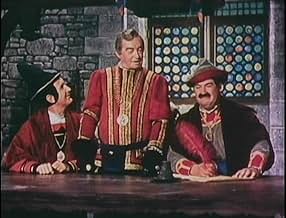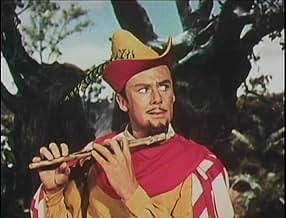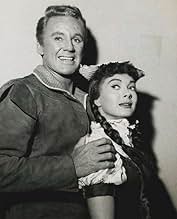Agrega una trama en tu idiomaOverwhelmed by rats, a medieval town hires a magical piper who can rid the town of the pest in exchange for gold but the crooked mayor has no intention of honoring the deal.Overwhelmed by rats, a medieval town hires a magical piper who can rid the town of the pest in exchange for gold but the crooked mayor has no intention of honoring the deal.Overwhelmed by rats, a medieval town hires a magical piper who can rid the town of the pest in exchange for gold but the crooked mayor has no intention of honoring the deal.
- Dirección
- Guionistas
- Elenco
- Second Counselor
- (sin créditos)
- Leading Citizen
- (sin créditos)
- Townsman
- (sin créditos)
- Citizen
- (sin créditos)
- Dirección
- Guionistas
- Todo el elenco y el equipo
- Producción, taquilla y más en IMDbPro
Opiniones destacadas
Like so many dramatic actors, Claude Rains surprised audiences who never realized he had such a good singing voice. In addition, Doodles Weaver (of Spike Jones fame) and Stanley Adams (Cyrano Jones in 'The Trouble with Tribbles') play off each other beautifully. Van Johnson does a lovely job in his dual roles as Truson and the Piper. My favorite moments are the opening, with the Piper slithering down the tree like a snake, and the song 'Prestige' - 'Prestige is the dinner they give you for fun, which they wouldn't have done when you really needed one.' Very clever lyric, that.
Yes, the screenwriters added a happy ending. This was, after all, a family show. Besides, it nicely pointed up the moral and showed that people can repent of poor behavior and become better people.
My mom had a big crush on Van Johnson so any appearance of his was a must see event - when it was first shown we kids were all gathered around the black & white TV. (Although the show was made in color, we didn't see it that way until later reruns. No one I knew had color television before the mid-sixties.)Certain scenes didn't look too familiar, but others produced a slight chill, reminding me of how spooky those knights on the clock seemed to a kid. (Maybe that's why the medieval clock at Frankenmuth, Michigan was disturbing to me as an adult tourist??) The colors on this particular DVD were bright but not really garish. As a 9 year-old, I was given a copy of the Robert Browning poem with Kate Greenaway illustrations. The original story was a lot simpler, and darker, with no Hollywood ending.
The behavior of the town's government is startlingly relevant for today's world, as the politicians sing about 'Prestige', unfurl long documents full of legal phrases in an attempt to cheat the Piper, show their willingness to accept credit for someone else's work, and refuse to help the neighboring town which has been swept away in a flood. The other town's children are scattered and hungry, but the Mayor and council send a sympathy note on fine vellum instead of food or help.
I don't know if a child of today would sit through the songs, but for the sum of one dollar, you can play it for a child you know and observe their reaction!
This film is unusual in a number of ways. First, it's a film based on an ancient legend that became most famous with an 1842 poem of the same title, by Robert Browning. Second, its screenplay uses dialog of rhyme along the lines of that written by Browning in his poem. Third, it has a cast with some prominent actors of the day, most of whom had not made a musical before or who were little known for singing. For these reasons alone, this film has some historical significance.
The film would probably be better known and highly regarded in the 21st century if there had been prominent singing actors in the lead roles. And, the musical score, while fairly good, could have been much better. As it is, most of the songs are in a general range of the speaking voice set to music. They do have melody - more than the spoken range set to music that was Rex Harrison's singing in "My Fair Lady."
Still, it's back to the unusual that adds some value to the film. Van Johnson has the double lead of playing the Pied Piper and Truson. Johnson got his stage start with musicals, and has a good voice. This is his only film in which he has a solidly singling role. And he carries half of the film himself. Claude Rains is superb in the role of the Mayor of Hamelin, and shows that he could at least belt out a tune in harmony. This is the only musical of any sort that Rains ever made. One can only imagine that it was the idea of the type of production and the character he could play that appealed to Rains. This very gifted actor received four Academy Award nominations but never won an Oscar.
Jim Backus is the King's Emissary, and this is the only role I can think of in which his part resembled singing. Lori Nelson as Mara, and Kay Starr as John's Mother, carry the female portions of song. Stanley Adams and Doodles Weaver add some comedy to the story in their silly antics as counselors to the mayor.
With its color and colorful presentation, I think this film would still be of interest to children in modern times. And, the moral of the story should still ring true to we older children as to the young audience.
Here are some favorite lines from the film. For more dialog, see the Quotes section under this IMDb Web page of the film.
Pied Piper, "A man can strive for riches, a natural desire; but he mustn't overlook a greater goal. Or what will he profit by something he'll acquire, if in finding what he gains he lose his soul?"
Pied Piper, "A man who's unwise only sees things with his eyes."
Mayor of Hamelin, "Stop squealing and squeaking as though you were rats. Remember that you're bureaucrats."
I agree that while this was originally conceived as a children's film, it would bore to death most kids today, having been desensitized by the blazingly fast pace of today's video and film styles. This is best appreciated as a bit of 1950s kitsch, and as such I find it an interesting museum piece. I was a bit puzzled by the lack of depth in much of the cinematography. It just didn't seem particularly cinematic, but looking it up at the IMDb and finding it to be a made-for-TV project sort of explained that to me. The look was dictated by the budget, and perhaps an idea that this shallow staging was best suited to the small screen circa 1957, which was very small indeed. As it was recorded on film rather than videotape, its origins as a TV production were not quite immediately apparent, but it's certainly an odd mixture of cinematic and television style.
What's been said below is true, i.e. garish primary colors, a clumsy sometimes-rhyming and sometimes-not script, saccharine sentimentalizing and simplistic moralizing. Some of the rhymes sound to be lifted from, or at least inspired by, the poem by Robert Browning originally published in 1887, "The Pied Piper of Hamelin: A Child's Story." Also, no doubt mandated by the demands of TV executives and/or sponsors, a happy ending is tacked on at the end which is quite unlike that of the original story. Regarding the odd name of Hamelin's unfortunate rival city, it seems to me that it was meant to be pronounced Hamel-OUT, as a simple (very simple) play on words (Hamel-IN and Hamel-OUT. In and out, get it? Har har!). Well, I guess they thought kids of the time would find that amusing.
It is an interesting idea to set a musical to tunes by Edvard Grieg, who produced an abundant supply of melodies. My guess is that this was inspired by the musical "Kismet" having used melodies by Alexander Borodin so effectively. Besides "Peer Gynt," there are tunes from Grieg's "Norwegian Dances" and his Piano Concerto. While the lyrics are hardly masterpieces, I did find it amusing to hear one of the Norwegian Dances adorned with the lyric "flim, flam, floom."
It's strange indeed to see chanteuse Kay Starr performing what sounds to me like a sultry torch song to lament the disappearance of her child. As the film was conceived as family entertainment, maybe this was thought to be something for the adults in the family, but the effect is just bizarre. I couldn't identify a Grieg melody in this song.
Van Johnson does a fine job in the dual roles of the Piper and Truson, the town civil libertarian and whistle-blower. More than addressing just the issue of human greed and deceit, the script seems a somewhat liberal take on the issues of free speech and the abuse of power in a democratic government. Good old Claude Rains seems to give his all in the role of the corrupt mayor of Hamelin, and though he's a bit long-in-the-tooth by then, he plays the part with relish and what seems to me total commitment. Good for him!
It seems to me that the main attractions of this film are its nostalgic and kitsch qualities, and if those attributes irritate you, you'd do well to avoid it, but it does have value as sort of a museum-piece curiosity, half video and half cinema, with some McCarthy-era liberalism thrown in. I'm glad to have discovered it.
¿Sabías que…?
- TriviaThis was the first motion picture ever made for television.
- ErroresHamelin ("Hameln" in German) is a town in Germany. They speak of using Guilders to pay the piper and to melt into gold bells. The Guilder was a Dutch coin and was silver.
- Citas
Mayor of Hamelin: You have an invention?
Pied Piper: I attract attention/ Chiefly with a secret charm/ On creatures that do people harm;/ The mole, the toad, the newt and viper./
[Chuckles]
Pied Piper: Who doesn't know of the Pied Piper?
- ConexionesEdited into Santa's Fantasy Fair (1969)
- Bandas sonorasIn The Hall of the Mountain King
Music by Edvard Grieg
Orchestral arrangement adapted from Grieg's music for "Peer Gynt"
Performed onscreen by Van Johnson (dubbed by an anonymous flute soloist)
with offscreen orchestra conducted by Pete King
Selecciones populares
- Is this available on DVD?
- Watch this film online
Detalles
- Tiempo de ejecución1 hora 29 minutos
- Relación de aspecto
- 1.33 : 1
Contribuir a esta página
























